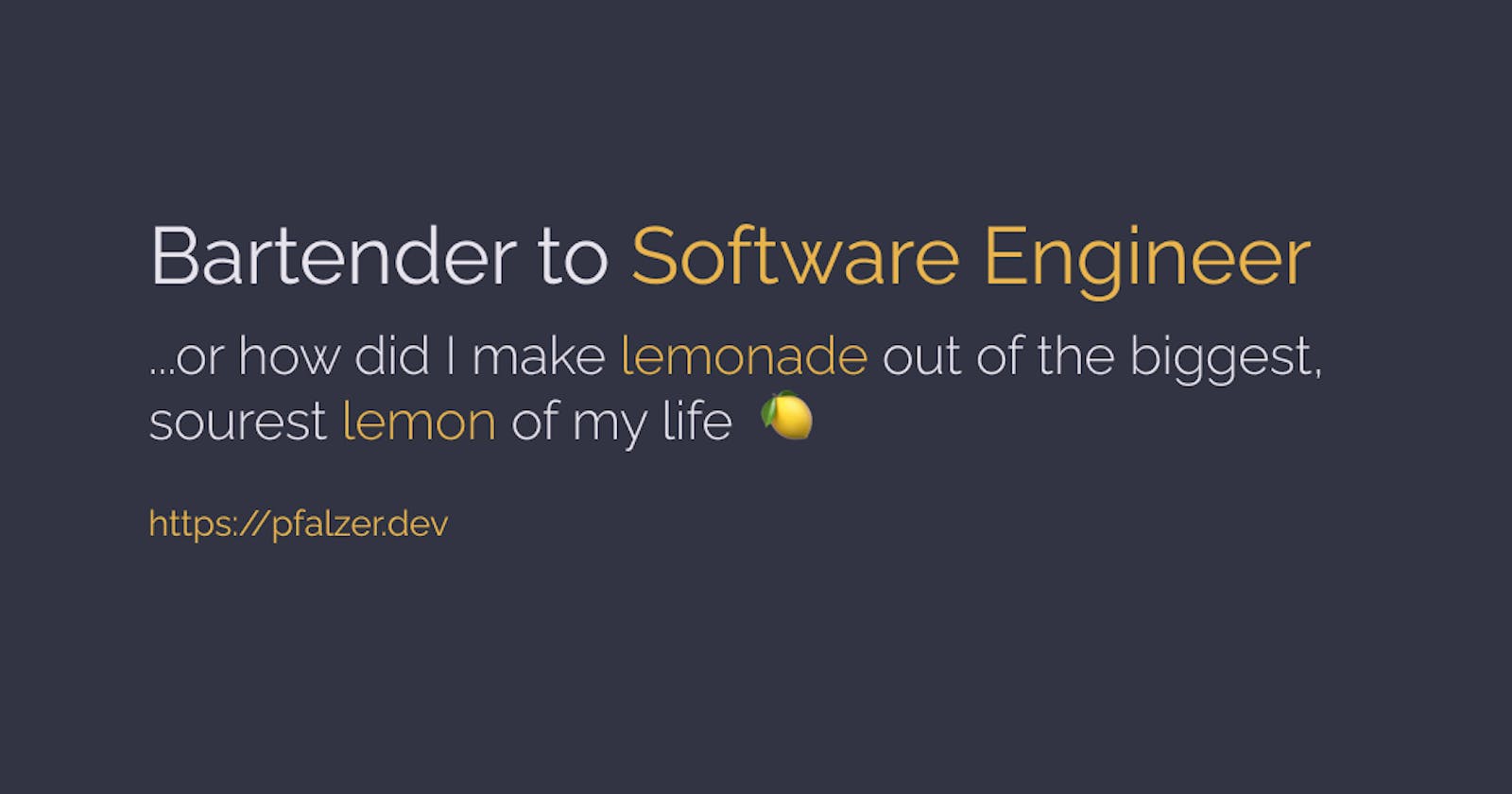Bartender to Full Stack Engineer - How did I make it happen? 🍸 => 💻
...or how did I make lemonade out of the biggest, sourest lemon of my life 🍋
Table of contents
- The backstory
- Getting into Coding
- Stage one, First lockdown - coding till I drop...
- Stage two, Back behind the bar - shake it till you make it...
- Stage 3, Lockdown again - building my portfolio
- Stage 4, losing my innocence - accepting reality
- Stage 5 - Power of teamwork
- Stage 6, becoming a better engineer...
- Getting my first job
- Finally...
Hello everyone! 👋
My name is Gabor, I live in London, United Kingdom. In early 2020, I lost my new job as a bartender. Never been unemployed in my life for more than a few weeks, and I was very confident in my skills in my chosen career. Thanks to words like "lockdown" and "social distancing" entering our collective vocabulary, I did not have a chance this time.
In August, 2021, I landed my first ever position as a Software Engineer. After being rejected for many junior roles, went into a mid level position as my first professional move. My first workday was exactly on my 33rd birthday.
I am closing an incredibly successful first year in this position. Having my first Christmas Holiday in my adult life, I wrote a tweet a few days ago, to offer help to people in similar situation, who might need help. Got tons of DMs, and the offer still stands.
🤯🤯🤯
The tweet blew up. Many people reached out in Direct Message, and I really, really hope I could actually help some of you in a way. Many of you asked about my full journey from full lockdown to full stack. Since it's a long story, I decided to write this post about it. I really appreciate the interest, hope I can help.
In order to be as useful as entertaining, I'm breaking the story up to stages I went through, and summarize some take-aways from each of those. Some details might end up being posts themselves. These are mainly things I found helpful for myself, and worked for me. Take them with a huge grain of salt. With my limited experience, I might easily be wrong there.
Everyone has a different journey. Different interests, different background, different skillset. This is how I leveraged mine. This is going to be my story, my way, reflecting my opinion. Hopefully, you can take some tricks away to leverage yours, and find your own way. Different view? Feel free to weigh in at the comments. I would be especially grateful for some senior opinion on my approach.
The backstory
For full disclosure, let me say: I actually started coding when I was around 9. I started playing around with Pascal in Elementary school on Tuesday afternoons. Like a club. A Computer Science student came over weekly to teach us, interested kids about computers and programming, and we had a blast.
Unfortunately, we moved to a different town. In Hungary, where I'm from, internet wasn't much of a thing at that point, and I kind of ran out of teachers to help. At some point later in high school, a wild VB .NET black book has appeared - it wasn't very effective. Later on, I was nicely explained that Computer Science might not be me - someone not very good at Maths. 🤷♂️
Kind of went into the other direction, later on. Humanities. I studied Japanese at the University. Got a scholarship in Japan where I had a beautiful year... and became a part time Japanese teacher. Then I was teaching so much, I actually stopped going to school all together.
I left two universities without graduation, then my country as well. Started a new life in the cloudy United Kingdom with a single suitcase. Like so many others, hospitality picked me up very quickly. I spent most of my twenties, building a career, first by working in cocktail bars, later trying to run them. It was actually something I really enjoyed.
I had a brief detour on the direction of the stock market. This turned out not to be a thing for me on a long run, but still a valuable lesson from life, that ended up very character building.
Truth to be told, I really, really enjoyed bartending. Especially bar management. I loved building and looking after a team, developing talent. I could build and streamline systems, set up and optimize operations, coordinate a team effort in creating menus, and genuinely care about people. Unfortunately, I hate the industry itself, and the way it does not care about their workforce or talent, and the frequently inhuman working conditions. Most of my days were balancing acts between frontline staff and head offices. Still, my goal was operations management. I always had excellent line managers to look up to, really enjoyed setting up and building systems, and genuinely though I can make a difference in how we handle people in the industry. I took a new job in a really cool bar in central London. Then Covid happened, and got fired after my third shift, for not being eligible for government financial support. This time, it got me thinking.
What helped me from my background?
- Nobody starts from zero. All experience you have in life counts.
- I dropped out of university, have no degree, Computer Science or otherwise.
- I did some coding, very young. It helped, but I might as well started from zero.
- Teaching Japanese taught me how to learn and teach better. Also learnt, that teaching and helping others is an excellent way of learning.
- Living and building a life in a different country, in a different language helps a lot with your flexibility. Also made me better handling uncertainty.
- My "failed" detour to the Stock Market gave me extreme resilience to frustration, failure, being able to stand up after being continuously kicked on the floor, after getting my lunch money taken. Also some major lessons in seeing objective reality.
- Used to hard work in bars, push for 60+ hours a week in a physically and emotionally demanding environment, and show example to others. Then also help running a business.
Getting into Coding
London locks down, livelihood goes straight out the closed window, and I sit at home, after used to working silly long hours, with nothing to do. The grieving period starts.
First, I started improving my Mandarin Chinese. I did it in university, always wanted to learn. I was playing around with basic accounting, it might come handy when I find a new job. Took some very, very random courses on Coursera. At some point, I even started to learn Swedish, not sure why. Had long chats over the phone with friends in the industry in the same situation, but with financial support, and jobs left to go back to. Luckily, I was also locked up in here with my wife, who happens to be an angel. No, she is not standing behind me, I'm writing this on my own.👼
I was standing behind her though, while she was studying for her ongoing Computer Science degree remotely. She is the best career advisor, she always told me what to do. She also told me where to go, when I kept talking into her python homework, remembering snippets of a time, when I really enjoyed coding as a kid.
In the meantime, the lockdown and the fact of my redundancy started to sink in. What went through my mind:
- I never want to get in the same position ever again.
- If this is how much my work is worth and missed, I might want to put some different value to the table
- I never stopped learning in my life, but I might as well learn something useful.
On that note, I was officially done. Took the advice of my lovely wife (smart lady), and started playing around with JavaScript. In a few days, I ended up receiving a free Pro membership for Codecademy, due to my current circumstances. Thank you Codecademy guys, I made it.

Great platform, if you like interactive learning experiences. I also started to play around with FreeCodeCamp, which is also an incredible resource. For a different vibe, check out Scrimba as well, top notch platform and instructors.
With my situation firmly in mind, down I sat. And since I didn't have anything else to do, got obsessed getting this done.
How to start?
- Figure out why, decide, and actually get started.
- Getting into code hasn't got a high barrier. High quality free resources are everywhere.
- Even the language doesn't matter. Just start something, see if you like it. If you won't end up working with it, skills still translate.
- Everyone learns differently, but interactive platforms are easiest to get into, since you are writing code from day one without any tricky setup.
- Don't be afraid to ask for help, someone might just be there to catch you. Or at least gives you a new clue.
- If you don't know if it is for you, you can still try. If you enjoy it, push. If you don't no worries. Everyone can code, but not everyone should. Do what makes you happy.
💻 💻 💻... 💻?
Stage one, First lockdown - coding till I drop...
Started coding, got a little bit obsessed with it. Growing up, I was always told, that I never finish anything I start. I tried plenty of things during my life, but I only stick with a few. I speak or understand at least 5 languages in different levels, went through half a dozen martial arts, ranging from a month two years. That's the key for my personality in terms of study, actually: I need to figure out what do I actually enjoy doing, then I end up getting obsessed with it, and hammer until I'm there. Otherwise, I drop it, take away snippets to translate, and chalk it up as experience.
I did that with Japanese, I still consider it my second home (after the UK), and always happy to talk. Same with bartending. I studied everything I could, practiced in my free time, wanted to work with the best people in the best places. I taught dozens of boys and girls who reached way further than I did. Collected wine certificates, became a Sake Sommelier (connecting to my love to Japan), studied operations management... and I carried these habits over, when I started to learn code. Because of this approach, I'm proud to say, never had a work in my life I didn't enjoy in some way.
I knew I want to get a job in tech, and I summarized my strategy in one sentence:
I keep learning and building my portfolio, until someone won't have a choice but to hire me.
In my first stage, I did a lot of interactive platforms, then I slowly started to transition to video based learning, mainly on Udemy. Got some good course recommendations from a developer friend of mine back in Hungary. It is very important to figure out, what style of learning works for you. Takes some experimentation for sure, and also changes over time. Recently, I spend more time with books and documentation. Your sources will change, as time goes on.
One of the best decisions I've made during coding, is starting #100DaysOfCode challenge to keep myself accountable. Ended up running three rounds, and being able to join an incredibly supporting community. Highly recommended for everyone.
One of my best friends also started coding this time. Learning together, keeping each other accountable, rubber ducking, pair coding and helping each other was very powerful. So was venting by shooting at each other in online games after study sessions.
At this stage, I was focusing my studies at HTML, CSS, JavaScript and DOM API. I preferred courses, where hands on practice, and independent exercises are common, and part of the curriculum. I also picket up the basics of the Command Line and Git. You cannot start these early enough. Towards the end of the lockdown, I was already learning React and Node.js, and got my first exposure for unit testing as well. Testing confused the hell out of me at this point though.
When I had all the time of the world...
- Since I had no job, or way to get one, I treated this like a full time job. I was coding 8 to 10 hours a day.
- Got familiar with my own life rhythm. I was productive from 6am in the morning, and got way less productive after 3pm. When not productive, call it a day.
- Cooking breaks, nice big walks outside with my wife after the first lockdown easing to clear my head. Switching off helps.
- I am very good at reading myself, and promptly switch off, if feeling overwhelmed. This was helping me not to burn out.
- My control is internal, so I studied by myself. Twitter helped me keep accountable. If you are more external control, and have the means, you might want to consider a reputable boot camp, or a more structured programme. Learning with others can also help.
💻 => 🍸❔
Stage two, Back behind the bar - shake it till you make it...
By the time bars reopened, we blew through our life's savings, it was time to get a job again. I was far from job ready in the after-lockdown job market, which still looks like a dumpster fire, so I had to pick up the shakers again. There is no shame in a tactical retreat. Run today, so you can fight tomorrow.
As a bartender, I had nearly 10 years of experience, including management, I was pretty sure of my skills. The point here was the decision. I needed:
- A decently paid job
- A good company that understands my actual goals, of not wanting to stay, but get value out of my presence. Was prepared to promptly refuse promotions. If I end up being a manager again, my plans are screwed.
- Peace to study and push on. Be simple enough, so I can turn up mentally exhausted, work from pure muscle memory, and still perform.
I managed to find a place fairly quickly. From senior positions in fancy bars, I went back to a little neglected cocktail bar of a casual restaurant, that could use a professional touch and a little love. Running that, even on the busiest day would require about 10% of my skillset, and my wonderful and supportive manager was more than happy to strike a deal in my hours. I gave them all my support, enthusiasm and expertise, in exchange for a decent pay, all all mornings off before 4pm, and two steady days off a week if the business can afford it. Obviously, I was moving in for all day shifts on Saturdays. One of the best restaurant companies I ever worked for, and their support was crucial in my success.
Next challenge was the new lifestyle. The key was, that I made my mind, committed myself to the change, and didn't go back the easy way. Work till four to midnight, then go home, sleep... wake up, code till 1pm, get on a bus, work. I listened to related stuff on the bus, widened my outlook on tech as a whole. Once the head is full, just listened to music, and didn't give a damn. This, in general would be a sure recipe for a burnout, but I'm lucky to consider both bartending and coding my hobby. By Sundays though, I felt like I was hit by a truck. That was my sleep day.
At this stage, I went deeper in React and Node.js, start playing around with my first complex-ish projects. Casually played around with Python and PHP, to start being language agnostic as soon as I can, and start connecting dots under the hood, instead of getting caught up on syntax. Enjoyed the process, and did not actually pressure myself with job applications. At this stage, there is still plenty of amazing courses available. Did a lot of Udemy courses, and content creators outside the platform.
When having a day/night job...
- Everyone has different circumstances. Sometimes, being able to dedicate an hour a day is a victory by itself, and consistency works in the long run.
- People need to eat. I repeat: There is no shame in a tactical retreat. Run today, so you can fight tomorrow. Get a job and keep learning.
- Sometimes you need to make trade-offs. I took a job I otherwise wouldn't. I've ended up in an amazing team, and been able to keep learning on the side.
- Be careful with burnout. Everyone has a different tolerance to it. Shut down if you have to, take a few weeks out.
🛠🛠🛠
Stage 3, Lockdown again - building my portfolio
Winter of 2020, lockdown again. Considering me and the wife both had our first round of Covid during the Christmas week, we at least had government wage support. Once pulled together, I went back at coding, building my portfolio this time.
Absorbed the knowledge I gained, but I didn't feel like I can actually build anything... so I started building something. I like building projects that stand out for some reason, or at least a little bit more unique. Even if the premise is simple, we can add something extra. Or as you learn in hospitality...
There is no traffic jam on the extra mile.
My first project started out as a Todo List with a twist. Everybody and their mother builds one (as they should - it's the first thing on a new dev's todo list✅ ), so might as well make funky. React application, that also becomes a reward tracker. It's my early way of saying, I can write fairly complex state management, half-decent UI, and I really want to reuse code. It was a pretty cool project. In retrospect, I'm harsh on my code here, but feel free to take it for a spin Here
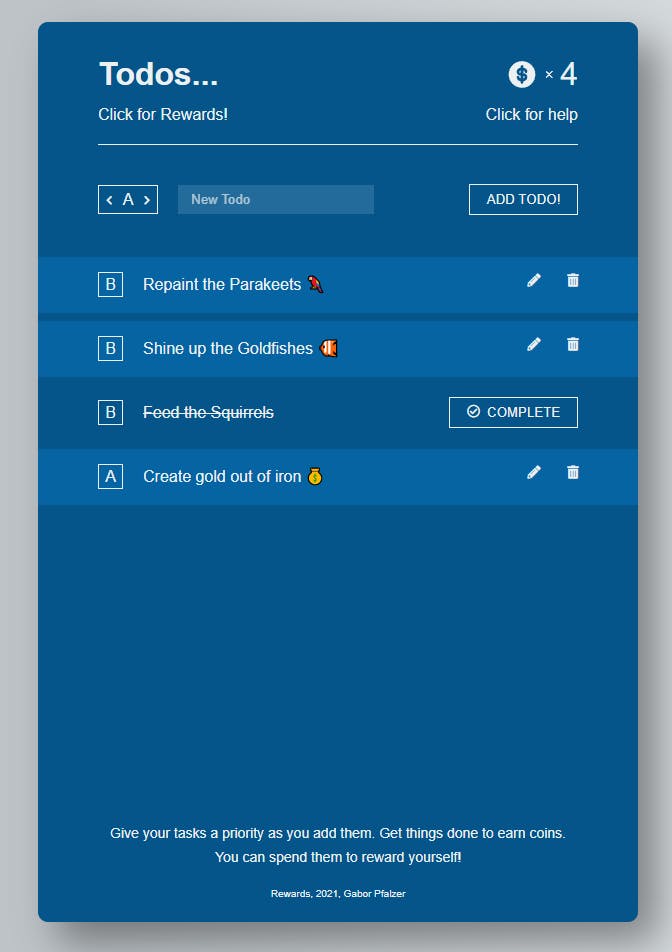
Some of you may recognise the inspiration of a project from Colt Steele`s React Bootcamp. That course was a real game changer for me. Extremely outdated React syntax, but he teaches you to solve problems. Simple explanation of a concept, then gives you an assignment to build yourself, then check back. I think this was the kick that got me out of the well known Turorial Hell, and start me on the track of actually writing code. From this point on, the strategy was to create projects for my upcoming portfolio, and get courses when I need, about what I need.
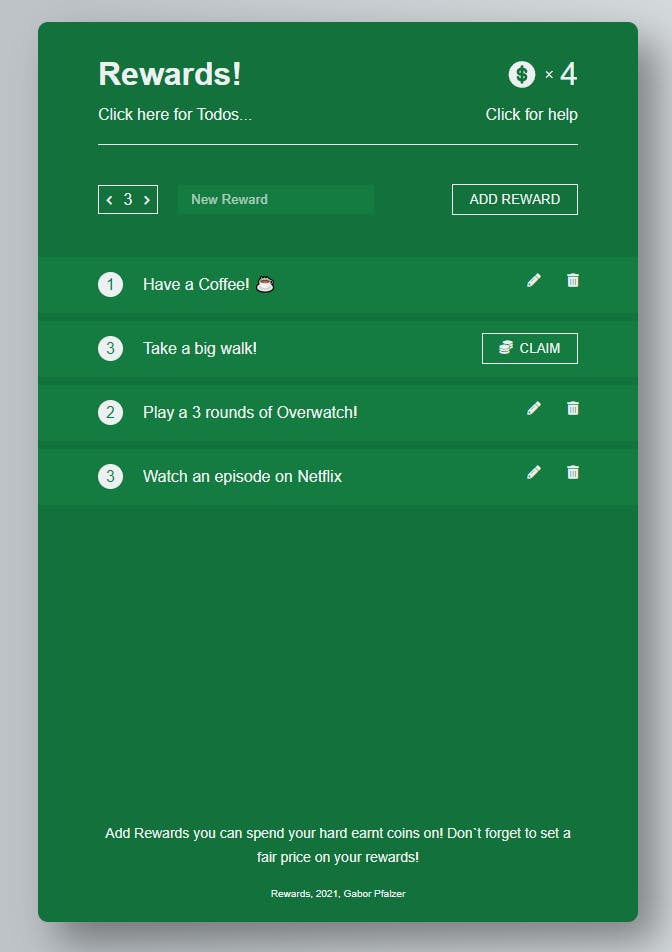
The next big lesson was my Tradelog application - a full stack stock trade tracker, inspired by my trading days. This project was a monster for me at that time. Took about 3-4 months to complete, took countless courses and resources to find answers to my very specific problems popping up, many hours of planning and re-planning. This is the first time I started to deal with complexity, writing large applications where I solve real, every day problems. The Github repo for this application got me an unexpected invite for an interview half a year later, which ultimately became a job offer.
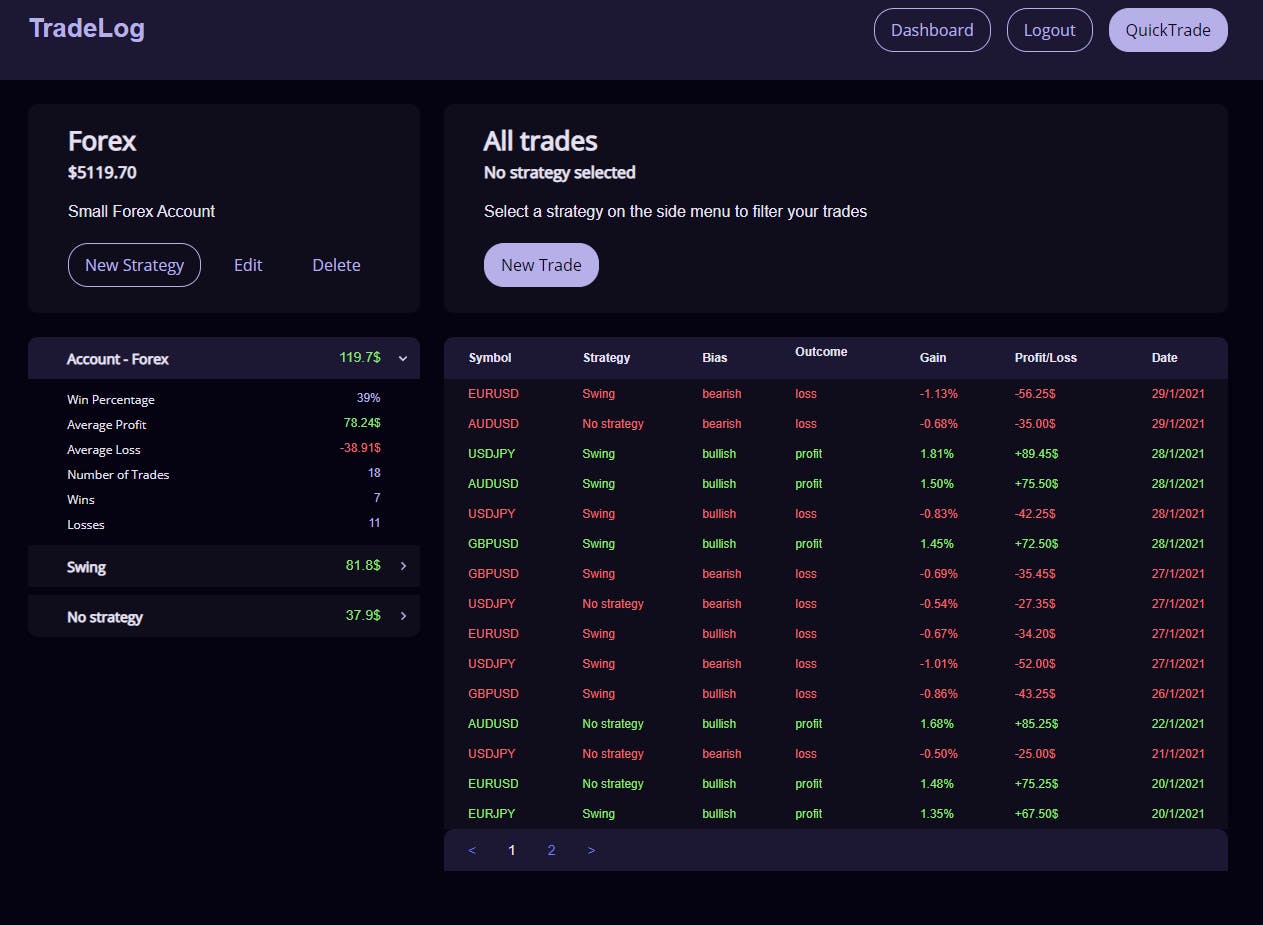
If I look at it now, my code is a mess. I was unaware of TypeScript, and I wish I wrote unit tests, but this was a huge step ahead. Also learnt about using the right tool for the right thing. Started the project with MongoDB, which turned out not to be the right solution at this case. Went away, spent two weeks of learning SQL, came back with Postgres. Ripped out the backend, flushed down, rewrite the whole stuff from scratch. Also a valuable lesson on not separating concerns right, and dangers of coupling. Complex state management on the frontend, modals, toasties, animated accordions and pagination from scratch, reasonably reusable code. Looks messy now, but pretty epic for me at that point. It was also the first time I started to learn about fundamental Design Principles, and start putting some designs together in Figma. Turns out I wasn't bad at CSS like I though, I was actually bad at design.
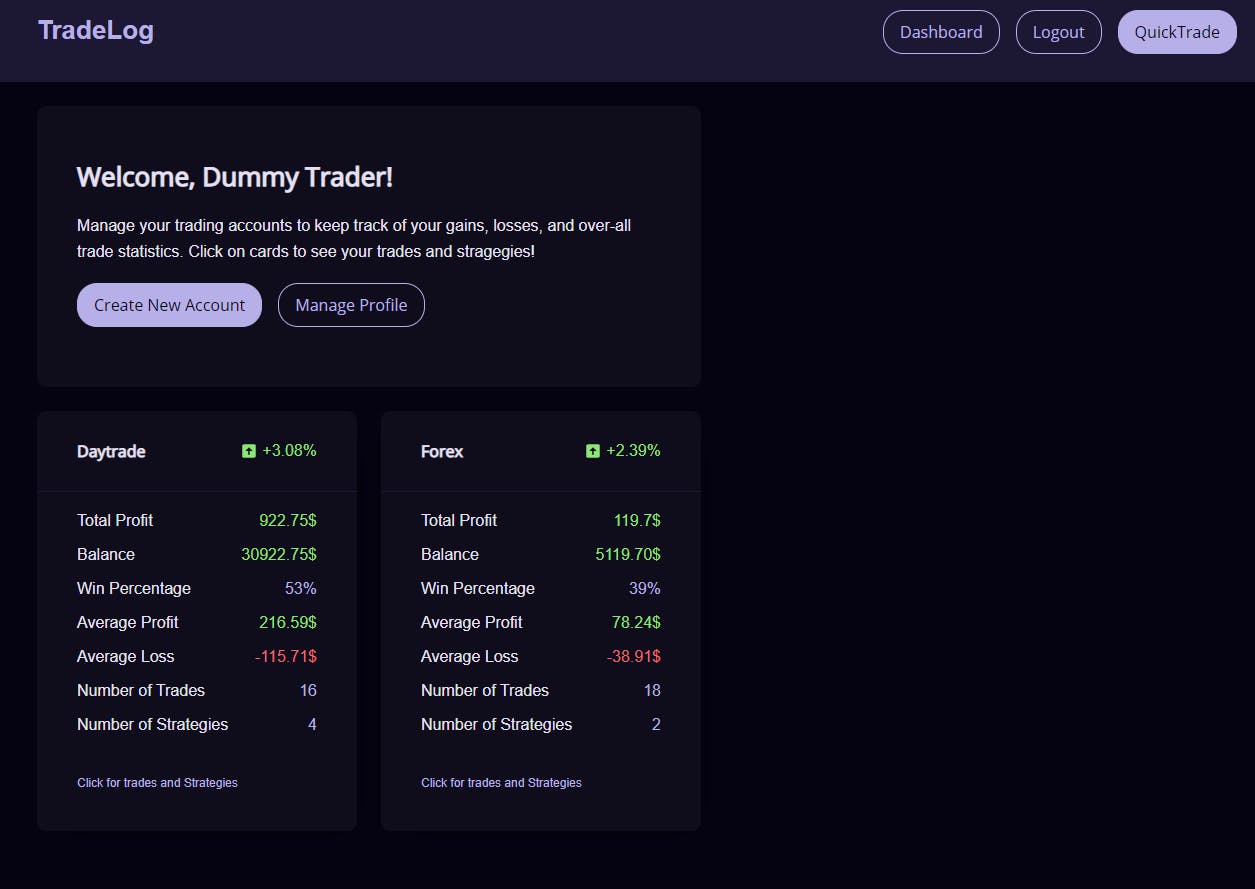
This is around the time, when I would say I was first job ready. Started to do some more market research for available tech jobs, what stacks are actually demanded in my area, to find my focus for the upcoming months, and focus a little bit more on my LinkedIn profile. At this level, finding resources becomes a little bit trickier. I learnt a lot from project based courses around full stack architecture, and read a lot more docs.
When creating projects...
- Start building. Most stuff you learn, won't make sense out of context, but clicks really quickly when you actually need it.
- Use your background for coming up with projects. Have you got hobbies? Any interesting past careers? Something you are passionate about? Build something around that. The closer to you the project, the more likely you actually finish it, and be proud of it.
- Even if you don't have a project idea, try to put something interesting in, or improve on the idea. If you show it on your portfolio, there should be a reason for it.
- Don't marry your tech stack, and don't define yourself with it. Use them as tools, as they make sense. Don't try to screw a lightbulb with a sledgehammer.
- At some point, you need to start creating more complex projects. You are paid to solve problems. If you built your simple projects, start upping your game. Don't have to spend months with it like me, I'm just simply crazy. But show off you can handle complex state, authentication, http requests, and you at least care about design.
- If not yet have one, get a good quality Rubber Duck to talk to at at this point. 🦆
🔥🔥🔥
Stage 4, losing my innocence - accepting reality
After going back to work from the second lockdown, my focus was on upping the stakes, picking up advanced tools, and facing reality.
Looking at job sites, all listings were senior, unicorn, but at least mid level. Junior positions, few and far between. Nobody wants full stack juniors. No one seems to care about MERN, whatever it is. No jobs were available for juniors with Node backend. At the same time, got 3-4 daily message for Senior jobs with my stack, requiring 6+ years of experience. Lot of Spring and .NET vacancies, PHP everywhere. Half the job listings I didn't even understand. This is the point, where I switched my target from job ready for overkill.
My perfectionist solution was coming back to my mantra:
I keep learning and building my portfolio, until someone won't have a choice but to hire me.
Since it seems like nobody in their sane mind builds anything at scale with JavaScript, I learnt TypeScript, and started building my projects in it. I rewrote my first app I made with vanilla JS and DOM API with TS React - a roleplaying dice roller app, I had a lot of fun with. Simple like a piece of rock, but I used TypeScript.
Automated testing is a reality in software engineering, a reality aspiring developers tend to ignore. I took a testing course. Then I built another evergreen junior classic - a Rock Paper Scissors app. You know my approach: put a twist in it. I made it with a Day 1, optional Lizard-Spock DLC (Reusable TypeScript code), and built the whole project in full Test Driven Development. I have a very specific outlook on TDD, but I learnt to love testing for it's benefits, and testing at work like a little angel. Testing came up at every single one of my interviews and assignments.
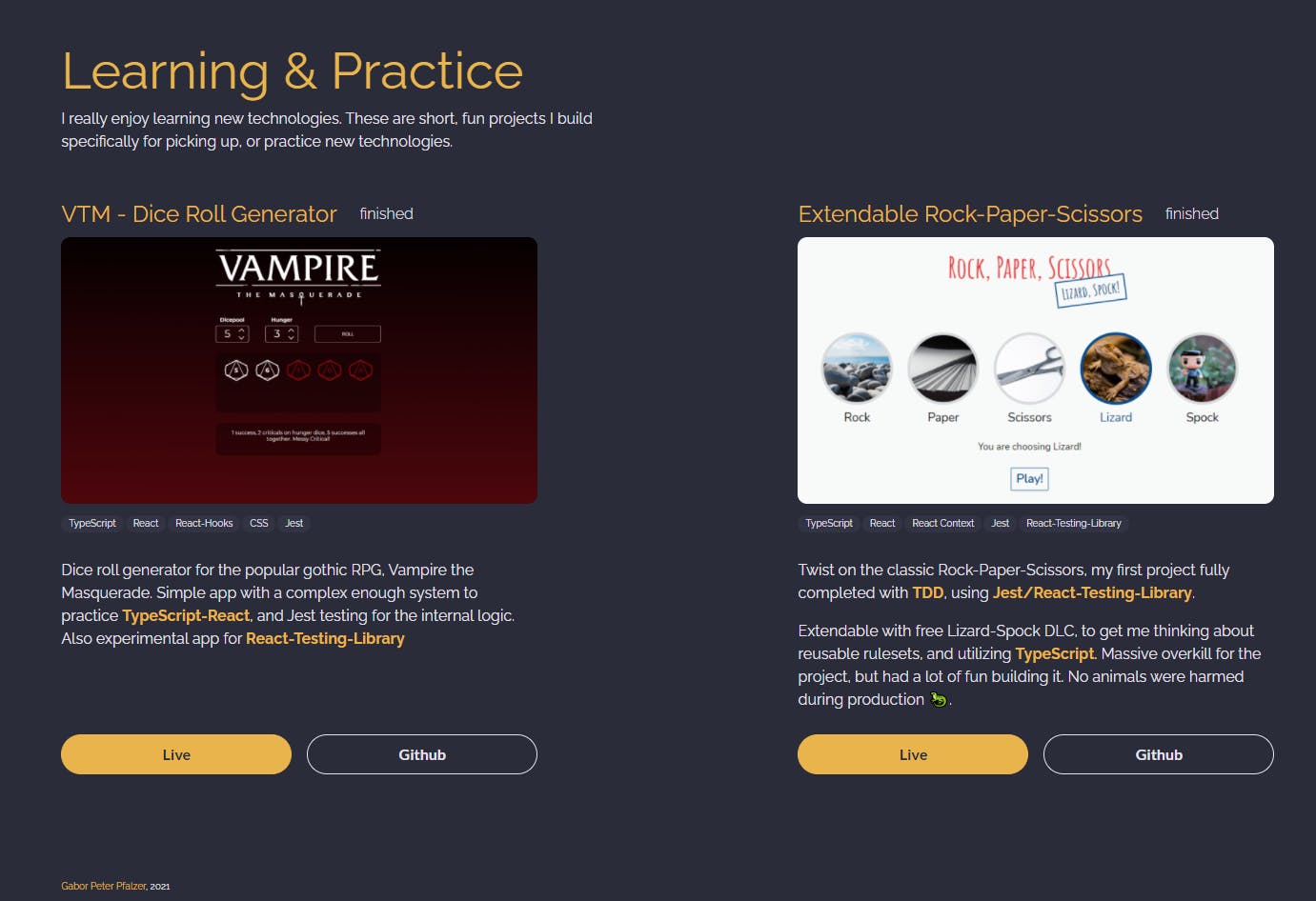
Since complexity was ramping up, I picked up Docker. Had a little detour to Vue, to see what the fuss is about, been doing some pair coding in Python with my wife... and as I was building my portfolio, worked a little on my design skills as well.
Design I feel, is particularly frustrating for aspiring developers. It is not our expected skillset. It is not going to be our job. It is someone else's job, who enjoys doing it. But your portfolio, your apps need to look good. Most people looking at your work has no clue about code, and not give a flying monkey's about it. They see something cool, like your sales pitch, they might send it off the someone techie. You don't need fancy design... but you need to make sure you can align stuff, understand visual hierarchy, and all your work is organized.
I was using my portfolio, and smaller, but fun projects to practice my new skills, polished my LinkedIn a little, and started applying for jobs. You can check out my portfolio in here, in the state it was when I was still applying for jobs. I'll update it at some point, just for fun.
To take you to the next level...
- Face reality. See what people actually looking for.
- You need a framework/library as a frontend dev. Which one, doesn't matter. Second one is easy to pick up, and you can apply anyway. Just choose the one you like and has job listings, then get good at it.
- Build a solid portfolio. It's probably more important than your CV, as a junior. Same for your GitHub.
- Try using tools professionals use. You might be able to start applying, don't let this stop you, but time passes anyway. Fill it up useful.
🤝🤝🤝
Stage 5 - Power of teamwork
At this point, I was already looking for jobs, had a good enough portfolio to do so, and I had a job to sustain myself in the meantime. Then the second best things happened to me on LinkedIn: an old friend, Reka reached out. She is a UX designer, and she want to work together on something fun. She is awesome by the way, feel free to check her work out on LinkedIn.
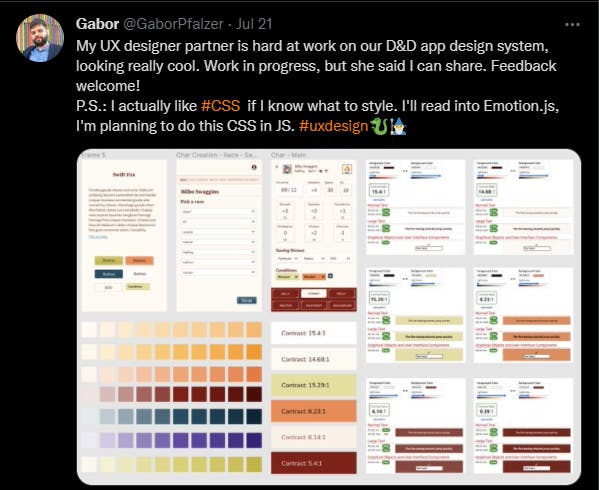
This is one of the most powerful things that happened to me during learning. She came up with a project: a character tracking application for Dungeon's and Dragons. Roleplaying is a hobby we share, so why the hell not. She was providing designs in Figma, she was doing project management and Kanban ticketing in Notion... I was writing full stack code. Full TypeScript React project, with TypeScript/GraphQL backend... with insane level of complexity for me at that time, and plenty of problems to solve. One step, one obstacle at a time. Most of our job is figuring out things, google and break things until they work. She was designing the product. She wants a drag and drop? Time to find out how drag and drop works. This is the point where the "I don't know how to do this" stops being a viable answer, like in an actual workplace.
It was amazing, the project went on two portfolios. It proved teamwork, exposed us to problems we would avoid in our comfort zone, and approximates a real workflow. Although the project did not get completed, it matured me into a professional position, and the story blew minds in the interview. I could have a real conversation with my interviewers about design process, project management, ticketing, an development workflow.
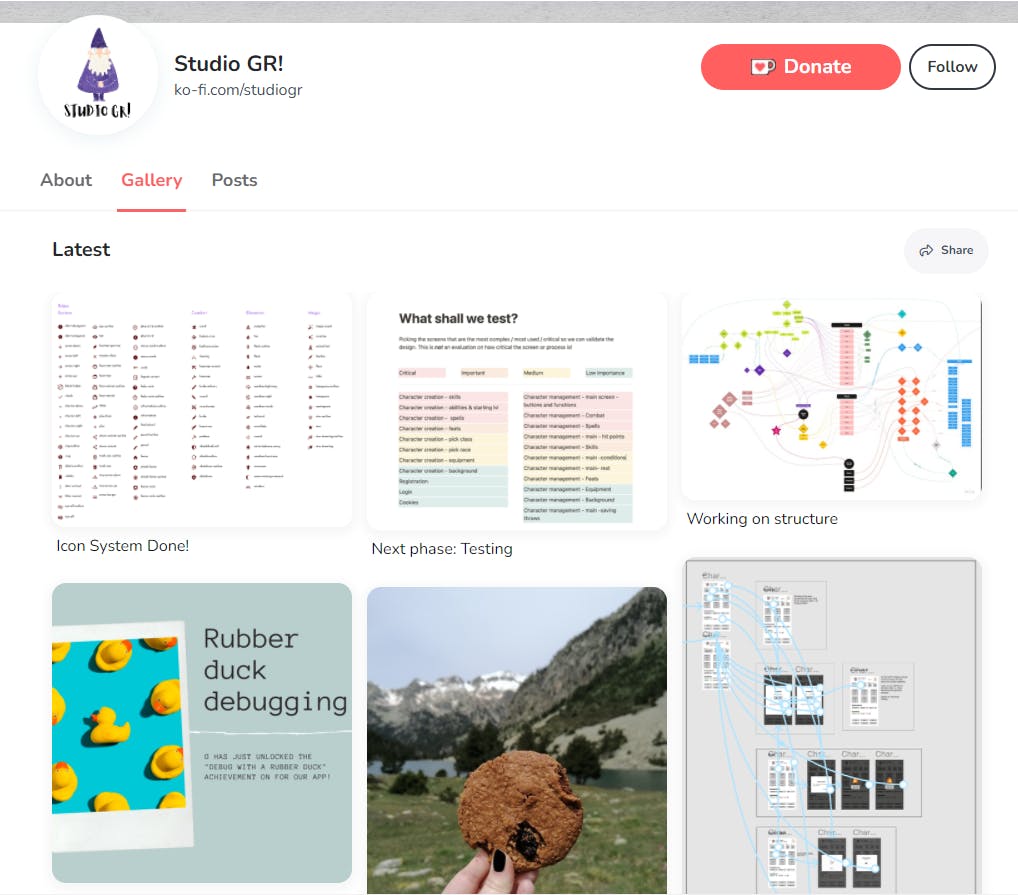
We even started a Ko-fi account to support us, and planning a new, hopefully useful side project in the new year, now that I'm settled in my new job.
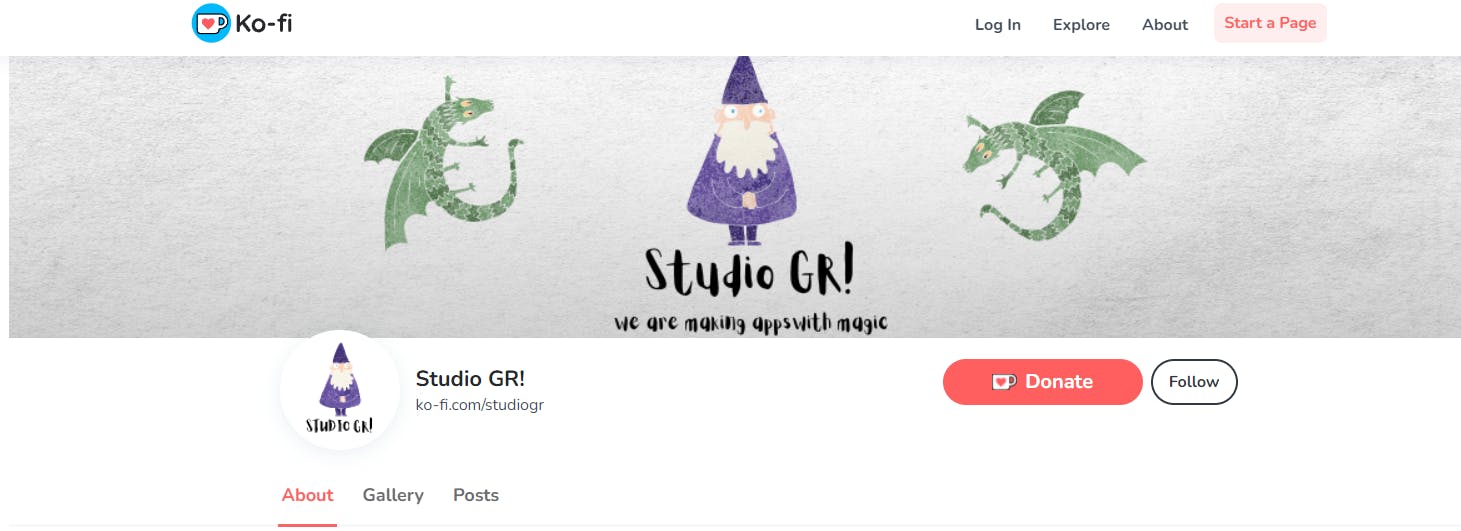
Team up!
- Software is developed by teams with different skillsets.
- Not good at design? Like most engineers. Pair up with an aspiring designer.
- Designing, but your stuff never gets made? Pair up with an aspiring developer, and you can show off some working examples of your work.
- Learning frontend, can't build a complex backend? Team up with an aspiring backend dev, who can't be bothered with CSS, and tired of having bootstrap on all her projects.
- Feeling ambitious? Get a whole team. You might even build a product.
- If working together, make sure to agree first. Credit each other, link each others portfolio, and make sure it's obvious, who did what. Be very ethical.
⚙🧪📈
Stage 6, becoming a better engineer...
Around spring of 2021, I was actively applying for tech jobs, and shook that shaker in the evenings again, like there is no tomorrow. Some rejected promptly, but mostly haven't even heard back from them. Sometimes I got a call. Usually awkward. They've been kind of looking for 5+ years experience. They only read your stack, apparently, not your bio. In the meantime, I deflected multiple bar/hospitality job offers that would immediately pay more than an expected junior software engineering salary. In bars I would have loved to work in previously. Suddenly we were not unskilled workers anymore for some reason.
After a few actual tech challenges and interviews (which I really enjoyed, but there were always someone better I suppose), I went through another paradigm shift in my head. I realized, I wanted to be a better engineer and problem solver. This is where my time went, apart from the monstrously huge, boss fight of a Dungeons & Dragons full stack app we've been working on at that point.
I tend to go for overkill, and since I do have some time left to kill while applying, I went in hard.
Started to learn Data Structures. I never wanted to work for a big tech company, certainly not FAANG (or MANGA now, whatever), but I did end up using data structures in my daily work, definitely made me a better engineer. Study still going on, there is a lot to get your head around, to really understand it.
Wanted to learn proper Object Oriented Programming. My general approach was very Functional at that point. It's a bit of a nightmare to learn OOP in JavaScript, so I actually ended up going for an excellent beginner Java course. With Java, I have no choice but to learn OOP. While at it, I also started to learn and apply Design Patterns. Also paid a lot of attention to clean code, organizing projects, and refactoring.
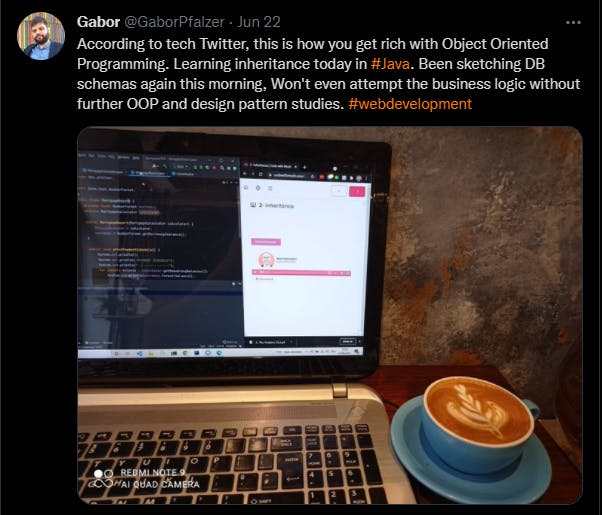
I only allocated an hour a day for this. Usually turned up at work early with a laptop, got a delicious coffee from our awesome barista, and did Java before work. This made me categories better as an engineer, and also started to hedge my bets, if I end up working with a Spring/.NET style stack, which is very common in London. By this time, picking up new languages are relatively easy, I would have considered picking that up quickly. Or Django, since I did Python before as well. At this point, I wasn't really bothered by stacks, concepts are pretty similar anyway. But I was looking at it like a side project. Also remember: I'm passionate, and kind of crazy.
Taking the next level
- Start applying early, but don't stop growing.
- At this point, finding high quality resources got fairly tricky. Conventional tutorials tend to stop around intermediate level, and fairly low complexity. The ones out there are getting pretty expensive, usually for a reason. The way was to create problems for myself with a real project.
- Fundamentals go a long way. You are paid the solve problems, that's the main skill to work on, and that is what you need to prove to get hired. Stacks will be learnt, and learnt again.
- Getting the first job is a frustrating experience. But if you are good enough, eventually, someone will have to pick you up. It would be silly not to.
💼
Getting my first job
After a few failed interview processes, tons of non-responses, I actually ended up getting a job I did not even apply for.
I received a LinkedIn message and a connection request from a gentleman, who is now my boss. He found my LinkedIn profile, checked out my portfolio, and loved my code on GitHub. Especially my Tradelog project, and the way I was thinking there. He has a senior position open, with more experienced applicants, but he would like me to have a chat and give it a shot.
I was incredibly humbled by this experience, and gave the interview process my best. Felt like I was a good fit for a team. Small but successful company looking for no-nonsense people who work hard. They loved the fact, that I have a joint project with someone, and have an idea how to work nicely with a design team. It was impressive that I'm comfortable with Git workflow and ticketing our tasks. Got a challenge and a half to take home (it was a monster of a project, got a real good run for my money), and a very enjoyable pair coding tech interview after. In two days, I got a congratulations, and a job offer for a mid-level software engineering position, possibly looking after my own project.
As mentioned, my first working day was my 33rd birthday.
To sell yourself well...
- Strong Portfolio. Make it look good.
- Strong Projects. Try to stand out, make something a little bit outside the box.
- Accessible projects on GitHub. Nice readme for the best impression. Make sure your code is clean. Don't worry, you are going to be very critical later anyway 😣
- LinkedIn presence. It is becoming a key. Check out on YouTube how to get it done. Highly recommend to check out Danny Thompson he is ace.
- Resume to point out your skills. Don't be afraid to show your previous industries. I showed my background, but summarised it briefly for the benefits it can bring to tech.
- Again: the range of tech and complexity I went into is probably crazy. You can probably get a frontend junior job with a half of this. I'm hoping someone confirms this in the comment. I definitely saw amazing boys and girls getting junior jobs with a fraction of my stack, and kept learning on the job. It's just me and my perfectionism, don't burn out if this is not you.
👋
Finally...
When I'm writing this post at Boxing Day 2021, I am happily working in my Software Engineering position, in a small, but amazing company. I get to make plenty of decisions, I'm trusted to do my job well and make an impact. I am grateful for all my co-workers who I really respect. This is also my first Christmas (apart from the one when I had Covid), when I don't have to worry about getting to work and back without public transport on Christmas day. It was a long ride, and really, really hard work. Feels like, the real learning just started.
Your story will probably be different. You might get your first junior position in six months, maybe nine. Might have other commitments, and takes you years. You might be a Cloud Architect. You might be into cyber security, or maybe building mobile applications. Or fascinated by smart homes, and internet of things. I might be web specific, but hope you can take something away from this one though. It's an amazing industry, desperately needing new talent. If my feeling is correct, it will have to start picking up more junior engineers very soon.
My viewpoint is a viewpoint, with a limited understanding. If you come from a different angle, please share. Made it differently? Please do tell in the comments. If you are in this for a while, and know better, please, please share. It will help a lot of people. Feel free to correct me anywhere, where your experience is different. I would love to hear your story.
Feel free to leave some likes, reach out or follow me on twitter at https://twitter.com/GaborPfalzer. I am sharing my daily thoughts and snippets of life (not code) as a new engineer, and planning to write a lot more on this blog. If you are interested in any topics in particular, please drop a comment or a message, let's see if I can share anything useful. I cannot get anyone a jobs, buy laptops or send money, but as long as my abilities go, happy to help anyone. I had a lot of help too. This one is a lot easier together.
